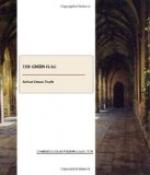Dodds’s eyes had already fallen upon this man, and he had wondered vaguely what he was doing in such company. He was a tall, white-haired, eagle-nosed gentleman, with a waxed moustache and a carefully pointed beard—an aristocratic type which seemed out of its element among the rough, hearty, noisy dealers who surrounded him. This, then, was Mr. Mancune, for whom the second telegram was intended.
As he opened it, tearing it open with a feverish haste, Dodds could perceive that it was as bulky as the first one. He observed also, from the delay in reading it, that it was also in some sort of cipher. The gentleman did not write down any translation of it, but he sat for some time with his nervous, thin fingers twitching amongst the hairs of his white beard, and his shaggy brows bent in the deepest and most absorbed attention whilst he mastered the meaning of it. Then he sprang suddenly to his feet, his eyes flashed, his cheeks flushed, and in his excitement he crumpled the message up in his hand. With an effort he mastered his emotion, put the paper into his pocket, and walked out of the room.
This was enough to excite a less astute and imaginative man than Worlington Dodds. Was there any connection between these two messages, or was it merely a coincidence? Two men with strange names receive two telegrams within a few minutes of each other, each of considerable length, each in cipher, and each causing keen emotion to the man who received it. One turned pale. The other sprang excitedly to his feet. It might be a coincidence, but it was a very curious one. If it was not a coincidence, then what could it mean? Were they confederates who pretended to work apart, but who each received identical orders from some person at a distance? That was possible, and yet there were difficulties in the way. He puzzled and puzzled, but could find no satisfactory solution to the problem. All breakfast he was turning it over in his mind.
When breakfast was over he sauntered out into the market square, where the horse sale was already in progress. The yearlings were being sold first—tall, long-legged, skittish, wild-eyed creatures, who had run free upon the upland pastures, with ragged hair and towsie manes, but hardy, inured to all weathers, and with the makings of splendid hunters and steeplechasers when corn and time had brought them to maturity. They were largely of thoroughbred blood, and were being bought by English dealers, who would invest a few pounds now on what they might sell for fifty guineas in a year, if all went well. It was legitimate speculation, for the horse is a delicate creature, he is afflicted with many ailments, the least accident may destroy his value, he is a certain expense and an uncertain profit, and for one who comes safely to maturity several may bring no return at all. So the English horse-dealers took their risks as they bought up the shaggy Irish yearlings. One man with a ruddy face and a yellow overcoat took them by the dozen, with as much sang froid as if they had been oranges, entering each bargain in a bloated note-book. He bought forty or fifty during the time that Dodds was watching him.




